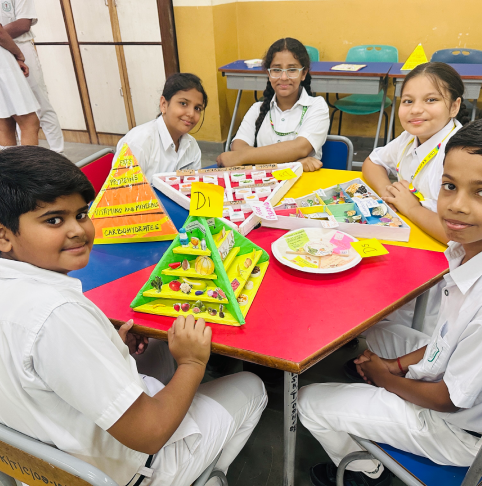Middle Stage
Middle Stage
- Home
-
Academics
-
Overview
-
Padagogy

Advancing from the preparatory stage, when our students move to the middle stage, we focus on offering a solid background for the upcoming classes. We are dedicated to creating a stimulating and engaging learning environment for students in grades 6 to 8. We implement the SMART (Specific, Measurable, Achievable, Relevant, and Time-Bound) framework to deliver structured, goal-oriented, and impactful learning experiences.
1. Specific Learning Goals: We define clear, focused learning objectives aligned with curriculum standards. This helps students understand the purpose and application of concepts.
2. Measurable Progress Tracking: Through continuous assessments, quizzes, and interactive activities, we track student progress. Structured feedback with assistance to improve upon weaknesses helps students head towards betterment.
3. Achievable Learning Milestones: We believe in setting realistic goals rather than burdening the students. So, our personalised learning plans, remedial support, and differentiated instruction help every student reach their full potential.
1. Specific Learning Goals: We define clear, focused learning objectives aligned with curriculum standards. This helps students understand the purpose and application of concepts.
2. Measurable Progress Tracking: Through continuous assessments, quizzes, and interactive activities, we track student progress. Structured feedback with assistance to improve upon weaknesses helps students head towards betterment.
3. Achievable Learning Milestones: We believe in setting realistic goals rather than burdening the students. So, our personalised learning plans, remedial support, and differentiated instruction help every student reach their full potential.
4. Relevant Real-World Applications: We incorporate real-life scenarios, experiential learning and interdisciplinary connections. Our technology-driven applications make all subjects meaningful and applicable.
5. Time-Bound Objectives & Efficiency: Lessons are structured with time-bound goals so that students complete tasks efficiently. Regular sessions and time management strategies help them balance their studies and attain academic success.
Key Focus Areas in SMART Learning:
1. Experiential Learning: Through experiments, projects, and trips, our students deeply understand and retain concepts.
2. Blended Learning Approach: We integrate traditional methods with modern technology, including interactive digital content and online resources, to make learning engaging and accessible.
3. ICT & Digital Literacy: Students regularly engage in coding, animation, and programming fundamentals. We promote responsible internet usage and make them future-ready.
4. Co-Curricular & Real-World Applications: Students participate in clubs, Olympiads, model-making projects, and real-world problem-solving scenarios. Financial literacy is also integrated into the curriculum to enhance practical knowledge.
5. Life Skills Development: A focus on arts, music, sports, and extracurricular activities helps in developing leadership, social responsibility, and holistic learning.
5. Time-Bound Objectives & Efficiency: Lessons are structured with time-bound goals so that students complete tasks efficiently. Regular sessions and time management strategies help them balance their studies and attain academic success.
Key Focus Areas in SMART Learning:
1. Experiential Learning: Through experiments, projects, and trips, our students deeply understand and retain concepts.
2. Blended Learning Approach: We integrate traditional methods with modern technology, including interactive digital content and online resources, to make learning engaging and accessible.
3. ICT & Digital Literacy: Students regularly engage in coding, animation, and programming fundamentals. We promote responsible internet usage and make them future-ready.
4. Co-Curricular & Real-World Applications: Students participate in clubs, Olympiads, model-making projects, and real-world problem-solving scenarios. Financial literacy is also integrated into the curriculum to enhance practical knowledge.
5. Life Skills Development: A focus on arts, music, sports, and extracurricular activities helps in developing leadership, social responsibility, and holistic learning.
